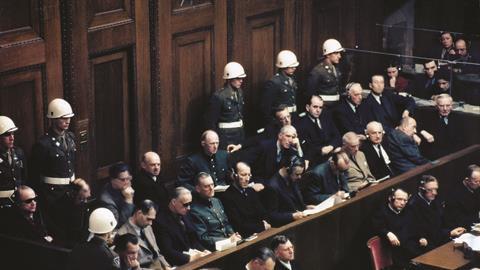Perpetrators of International Crimes: Theories, Methods and Evidence
Alette Smeulers, Maartje Weerdesteijn and Barbora Hola
£80, OUP
★★★★✩
What in heaven’s name turns people into terrorists, or even war criminals? What sort of person could maim or kill in the name of a religion or ideology? They must be monsters. This book sets out to attempt to answer those questions in a series of essays written mainly by criminologists. Covering genocide and political violence from the Nuremberg trials in the 1940s, through to conflicts well into the late 20th century, this books makes for a depressing litany of horror. Mankind seems desperate to invent new methods of killing and terror with industrial efficiency.
If an entire society loses its humanity who do you punish? Is it just the leaders of ideology who wrote the books and developed a poisonous creed, or the foot soldiers who did the actual killing? Should the administrators be punished? These are the functionaries who did not invent it or plan it but carried out mass murder. Time has passed and most of the leaders and administrators from the Nazi era have died. Justice can only punish the people who carried out orders.

This leads to the question of whether perpetrators who were brought up to respect and obey authority should be punished. Well, yes because ‘just following orders’ is simply an excuse. Another issue from more recent conflicts is that perpetrators were abused: for example, children were abducted and forced to become juvenile soldiers and then made to commit atrocities.
The Nuremberg trials were one of the first attempts to put war criminals on trial and not just execute them. They resulted in an opportunity to study evil in detail. Many academic psychological and medical books were written on this as well as biographies and accounts from those involved.
Some of the Nazis were found to be narcissistic, sadists or psychopaths but many were not. There is a marvellous phrase, ‘banality of evil’, which describes the conundrum well. Take Adolf Eichmann, who was captured by Mossad in Argentina in 1960 and put on trial in Jerusalem in 1961, and was described as ‘terrifyingly normal’. We want these people to be mad monsters because we cannot imagine a sane person doing evil things. If we then discover they were mentally disordered we would find that equally intolerable because we do not normally punish people who are ill. This is a fascinating but troubling topic which we need to understand better.
David Pickup is a partner at Pickup & Scott Solicitors, Aylesbury
- Would you be interested in writing a book review for the Law Society Gazette? The Gazette receives books on a range of legal specialisms, as well as fiction, history and biography. If you are interested please write to Nicholas Goodman indicating your specialism
































1 Reader's comment